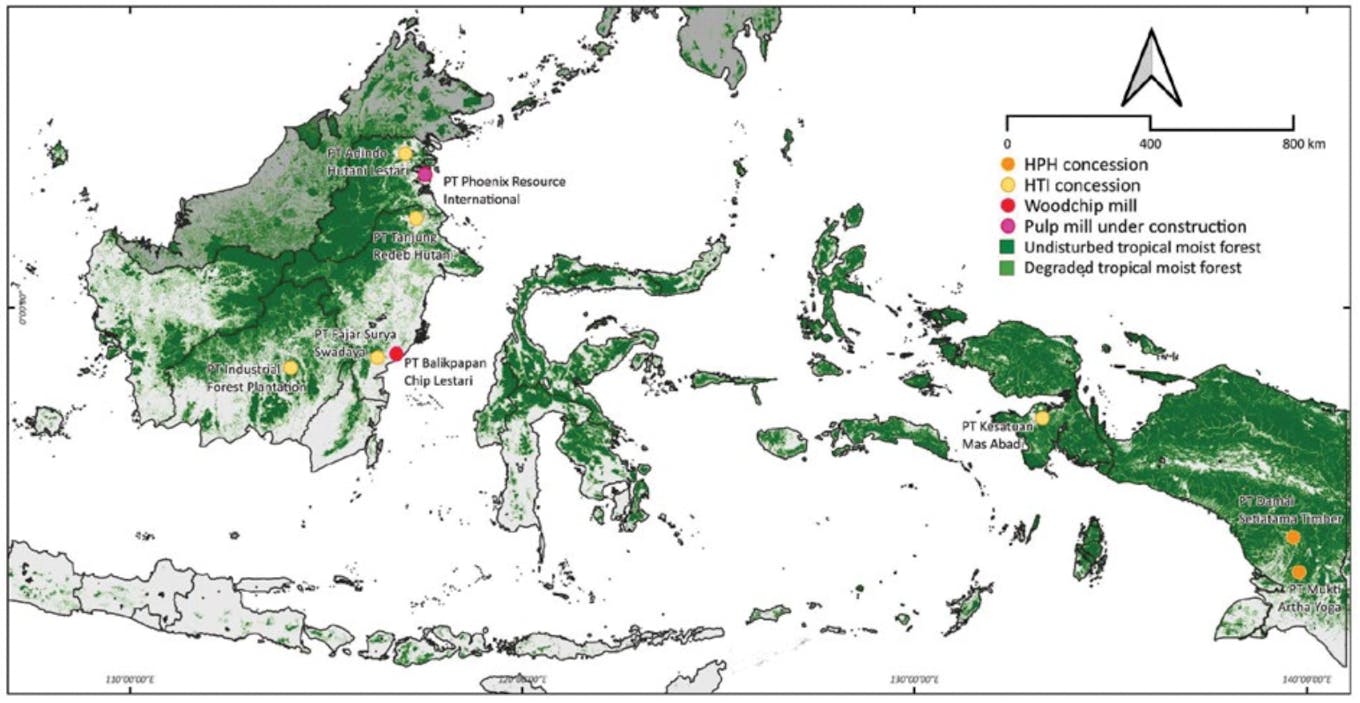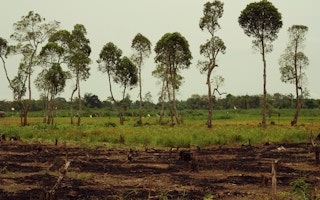Deforestation has been identified in the supply chain of Royal Golden Eagle (RGE), one of the world’s largest palm oil and pulpwood companies, according to an investigation by environmental campaign groups.
To continue reading, subscribe to Eco‑Business.
There's something for everyone. We offer a range of subscription plans.
- Access our stories and receive our Insights Weekly newsletter with the free EB Member plan.
- Unlock unlimited access to our content and archive with EB Circle.
- Publish your content with EB Premium.
The Singapore-listed owner of Indonesian paper firms Asia Pacific Resources International Limited (APRIL) and Asia Symbol has been linked to the clearance of prime orangutan habitat in Central Kalimantan, Indonesia, which was processed through a mill belonging to the company in China, the report titled Pulping Borneo asserts.
According to satellite and trade data analysis published on Tuesday (23 May), Asia Symbol’s pulp and paper mill in the Chinese coastal city of Rizhao received wood from bulldozed natural forests in Kalimantan in 2021 and 2022 by suppliers to PT Balikpapan Chip Lestari (BCL), a woodchip mill in the province.
The firms that supply BCL have cleared 37,105 hectares of forest in Central, East, and North Kalimantan – an area equivalent to half the size of Singapore – since RGE made a landmark no-deforestation pledge in 2015, according to the analysis.
Asia Symbol acknowledged BCL as a supplier, and said it would investigate the matter, according to the green groups behind the study, which include Auriga, Greenpeace, Rainforest Action Network, Woods & Wayside International and Environmental Paper Network.
In a statement, RGE said it “categorically refutes” the claim made in the report that BCL is under its control. It said “no such association, influence or control exists” over BCL, so it cannot comment on the firm’s activities.
The report also linked RGE to a large new pulp mill under construction in northern Kalimantan.
Once operational, the mill will churn through 3.3 million green metric tonnes (green tonnes refers to the weight of wood before it has been dried) of fibre a year. It will have a total pulp capacity of 1.7 million tonnes per year, according to an environmental impact assessment.
The NGOs worry that the mill will put pressure on natural forests near it, as the increase in demand for wood that it creates could lead to the conversion of forests into monoculture plantations.
Environmental groups raised similar questions about a plan to expand APRIL’s flagship pulp and paper mill in central Sumatra that emerged in 2021, and a massive paper mill that APRIL’s competitor Asia Pulp and Paper (APP) built in South Sumatra in 2017.
The new mill in Tarakan, northeastern Kalimantan is connected to RGE through ties to the mill’s owner, PT Phoenix Resources International, according to analysis of corporate records in the report.
The new facility will place 600,000 hectares of tropical forest at risk that falls within concessions that are currently supplying BCL in North, East, and Central Kalimantan and those linked to RGE companies in South Papua and West Papua, the study finds.
RGE denied the connection to PT Phoenix Resources International and said that links identified between RGE and both PT Phoenix and BLC were “speculative”.
”Previous employment by individuals at our business groups is presented in the report as an indication of a current connection to RGE. We operate in a free and open employment market in which employees can choose to join or leave companies as they wish. None of the arguments alleged in the report establish any connection or form of ‘control’ to these companies.”

A map of forestry concessions linked to RGE, PT Balikpapan Chip Lestari, and PT Phoenix Resources International. HPH concession refers to natural forest concession rights, HTI concession refers to pulpwood plantation concessions. Source: Pulping Borneo
RGE added that its group businesses operate in line with its sustainability framework, which includes “explicit no deforestation commitments, and each business group develops and enforces its own sustainability policies consistent with their operating context and RGE’s overall framework.”
“These companies also have ambitious 2030 sustainability targets that aim to contribute to the achievement of national and global goals on climate, nature protection, and sustainable development,” the company said.
The report also reveals evidence that suggests that RGE and its affiliates are connected to a network of companies that it does not publicly admit that it controls. These firms include shell companies based in offshore financial hubs such as the Cayman Islands that hide the company from scrutiny, the report alleges.
This story was edited, adding a response from RGE








